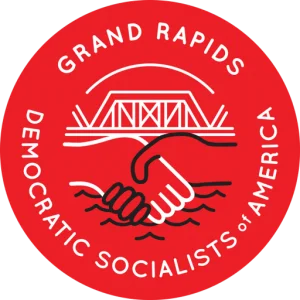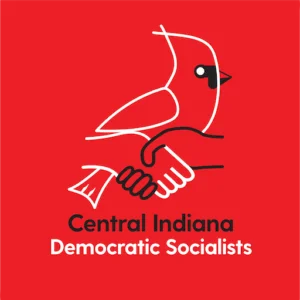

Your National Political Committee Newsletter — A Red Hot Socialist Summer!
Enjoy your July National Political Committee (NPC) newsletter! Our NPC is an elected 18-person body (including two YDSA members who share a vote) which functions as the board of directors of DSA. This month, help stop deportation flights, check out Convention updates, and more!
And to make sure you get our newsletters in your inbox, sign up here! Each one features action alerts, upcoming events, political education, and more.
- From the National Political Committee — A Red Hot Socialist Summer!
- No Flights for Abductions! Take Action Today
- Convention Update — Solidarity Journal Deadline Tonight, Friday 7/18
- Nominations for World to Win Fellowship Close Tonight, Friday 7/18
- Join us Sunday 7/20 to Learn How to Run a Membership Drive in Your Chapter!
- Monday 7/21 — RSVP for Lessons from the Zohran Campaign and Next Steps for our Electoral Work
From the National Political Committee — A Red Hot Socialist Summer!
As we come up on DSA’s 2025 Convention, we see our members wrangling with big questions of democracy and grappling with analysis of our campaigns and strategies. But we know for sure that whatever our delegates decide, we’ll come out of Convention energized and ready to turn words into action.
And while our delegates focus on Convention this summer, so much organizing is going strong all over the country! DSA chapters from coast to coast are hitting the hot pavement this summer to fight for labor rights, electoral victories, the right to dignified housing, broad protections for immigrants and trans folks, an end to imperialist violence, and so much more.
We just saw a massive win as NYC-DSA took on the rotten establishment and propelled democratic socialist Zohran Mamdani to victory in the Democratic mayoral primary in the wealthiest city in the world! We invite you to join us, our National Electoral Commission, NYC-DSA’s co-chairs, and other folks from the Zohran campaign to a debrief call on Monday night at 8pm ET/7pm CT/6pm MT/5pm PT. Let’s dig into the nitty-gritty of the campaign together: what can we learn about the vigorous comms strategy or the robust field game, and how can we replicate that work and turn those lessons toward electoral work and other campaigns elsewhere in the country? And how can we, as DSA members, support the other insurgent candidates who are running races in Tacoma, Detroit, Somerville, and more? Join us and find out!
There is so much to learn about and analyze from this incredible campaign, and a lot comes down to the DSA Difference. Zohran’s development as a political organizer came through DSA, and his historic win continues to help us build our organization, as he showed at a recent volunteer appreciation day where he recruited NYC DSA’s 10,000th member! Zohran’s campaign focused on cost of living, and also had internationalism deeply baked in, demonstrating that our causes cannot be separated. To bring together the working class against relentless ruling class attempts to keep us divided, a laser focus on economic demands and cost of living can work closely with standing up strong against injustice around the world. His long-time and open defense of a Free Palestine, against vicious attacks from the establishment, energized so many voters that stuffed-shirt consultants have ignored and badly discounted, and even increased credibility that his campaign is prepared to deliver here at home.
It’s our active, focused organizing on the outside that makes it possible for our electeds to stand strong on principles. The coalition fueling Zohran had long been demonstrating on the streets, in our workplaces, and base-building in our communities to show we share goals across all kinds of differences to transform our society. Our DSA chapters are out there fighting for universal economic demands, just as we are fighting for Palestinian rights, demanding an immediate end to Israel’s aggression against Iran, taking on BDS targets like Chevron and Maersk, fighting for the rights of immigrants to be safe in our workplaces and our communities, and recognizing that immigrants must be protected both within the US and from the conditions that make people economic refugees in the first place.
And it’s happening across the org! Humboldt DSA and Salem DSA both took up our Boycott Avelo campaign, pushing back against this airline’s willingness to take ICE contracts and deport our neighbors. These chapters saw big wins this month, with the City of Eureka, California ending its Avelo contracts and Salem, Oregon seeing Avelo pull out of their airport completely under pressure to have the City of Salem end their contracts. You can find out more about these victories and how your chapter can be next on our Boycott Avelo call Tuesday 7/22 at 8pm ET/7pm CT/6pm MT/5pm PT!
DSA has also signed on nationally to the National Iranian American Council’s No War With Iran campaign and Progressive International’s Block Baerbock Campaign against the UN’s warmongering new President of the General Assembly, Annalena Baerbock. We encourage you to sign onto these petitions and keep an eye out for new ways to get involved.
We hope you’re taking a little bit of time this summer to sit by some water, take a nice walk somewhere green, or kick back by the grill with some folks you love. We are fighting enormous, world-historic fights, and remembering what exactly we’re fighting for is so important. We’ll see you on the picket line, at the rally, or in a lawn chair by the lake sometime soon!
In Solidarity,
Megan Romer and Ashik Siddique
DSA National Co-Chairs
No Flights for Abductions! Take Action Today
DSA chapters have officially joined the national call to boycott Avelo Airlines, who announced a $150 million contract in April to fly deportation flights for ICE out of Arizona. We even had our first DSA win in Eureka this week, where Humboldt DSA members bravely spoke in front of city council to call for an end to subsidies for Avelo, and city council agreed to boycott the airline!
This is only the beginning. For the next several months, we will push Avelo to drop its horrific contract with ICE, and we won’t stop until we win. Join us!
- Take action now! Send 40 letters in one click to top Avelo leadership and their allies.
- And sign up here to get involved as a chapter.
Convention Update — Solidarity Journal Deadline Tonight, Friday 7/18
Say hi to comrades in the Convention Solidarity Journal! The deadline to purchase an ad and submit your artwork is tonight, Friday 7/18, at midnight Pacific Time. The Solidarity Journal will be distributed to all Convention attendees and shared online. You, your chapter, working group, or committee can place an ad in the Solidarity Journal to send a message of solidarity or of celebration to your chapter, work, or comrades.
Please note that Solidarity Journal messages advocating for or against any convention proposal, NPC candidate, slate, or DSA caucus will not be accepted. Journal space is available in three sizes, plus text-only solidarity messages. Ads should be sent as PNG, JPG, or TIFF files, color or black and white. You can find more details and buy your ad here.
Nominations for World to Win Fellowship Close Tonight, Friday 7/18
A World To Win fellowship nominations close tonight, Friday 7/18 at midnight! DSA Fund’s A World To Win fellowship is for organizers doing groundbreaking work to bring new communities into the movement for democratic socialism. Fellows will receive a $5,000 award, a set of virtual workshops with democratic socialist luminaries, and opportunities to share their work with comrades across the country. Don’t wait, nominate someone today!
Join us Sunday 7/20 to Learn How to Run a Membership Drive in Your Chapter!
As DSA is getting a bunch of publicity from the Zohran campaign in NYC, many chapters are getting a bump in membership. And in the lead up to the general election, chapters can use that publicity to re-engage their membership lists and recruit new members. Join the Growth and Development Committee Sunday 7/20 at 2pm ET/1pm CT/12pm MT/11am PT for a training to teach chapter leaders how to do that!
Monday 7/21 — RSVP for Lessons from the Zohran Campaign and Next Steps for our Electoral Work
Join the National Electoral Commission, our national co-chairs Megan Romer and Ashik Siddique, and NYC-DSA co-chairs Grace and Gustavo to discuss Zohran’s historic campaign from behind the scenes! 
PLUS hear from DSA endorsed candidates across the country on our record-breaking fundraising campaign and how you can get involved.  The call is on Monday 7/21 at 8pm ET/7pm CT/6pm MT/5pm PT. RSVP today!
The call is on Monday 7/21 at 8pm ET/7pm CT/6pm MT/5pm PT. RSVP today!
The post Your National Political Committee Newsletter — A Red Hot Socialist Summer! appeared first on Democratic Socialists of America (DSA).




Fight Fascism/Build Socialism: Intro to the GRDSA
Are you fed up with rising rents, low wages, climate inaction, and billionaires hoarding more while we struggle with less? You’re not alone — and you’re not powerless.
We would like to invite you in learning about Democratic Socialism to our Mass Intro event that we are holding on July 27th at the DAAC! Our chapter has existed since 2017 and among other things, we have focused on issues including Labor, Housing, Trans rights, the Environment, Medicare for All, and fighting for the working class in general.
We will have tacos, speakers, and music that we can all sing along to. Come celebrate Zohran Mamdani’s victory in the New York City Mayor’s Democratic Primary and help build our own Socialist movement in West Michigan.
This event is perfect for:
✅ Newcomers curious about what democratic socialism really means
✅ Anyone ready to get involved in building a better, more just world
✅ Existing members looking to reconnect or bring a friend
Together we can create a better world for all of us if we all work towards building our chapter and collaborating on future projects and events.
Solidarity!

The post Fight Fascism/Build Socialism: Intro to the GRDSA appeared first on Grand Rapids Democratic Socialists of America.


Dumped: How Charter Schools Cook Their Books, Choose Their Populations, and Profit


On The Value of Research


